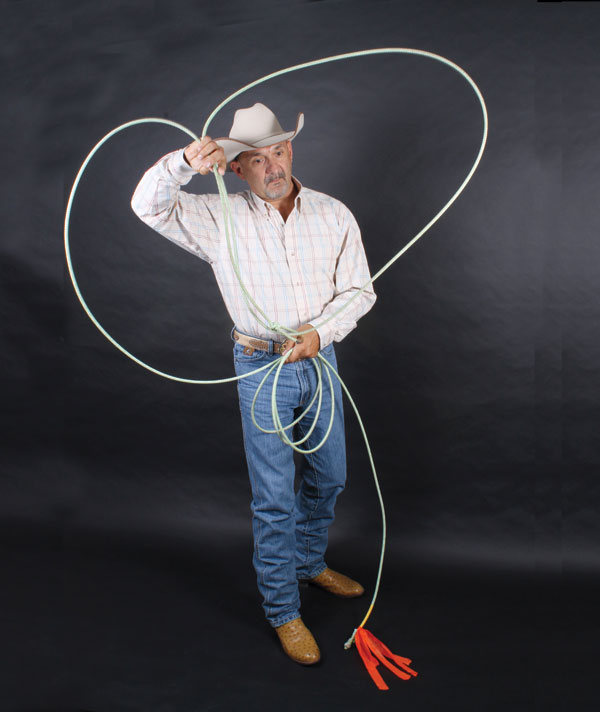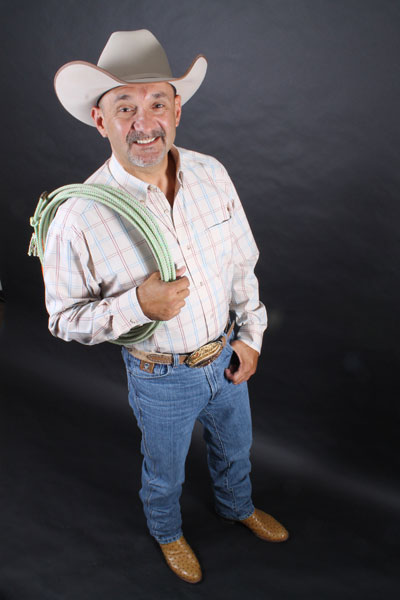As the International Gay Rodeo Finals return to North Texas, we examine the connection between the gay culture and the cowboy way

THE COWBOY WAY | Charlie Colella shows the form necessary to score points at the rodeo, but his favorite event is pole bending, a combination of speed, precision and horsemanship. (Arnold Wayne Jones/Dallas Voice)
ARNOLD WAYNE JONES | Life+Style Editor
jones@dallasvoice.com
Like a true Texas transplant, Charlie Colella wasn’t born to the rodeo, but he got there as fast as he could.
Even today, at 51, Colella’s family doesn’t quite understand how a boy reared in the Chicago suburbs, who holds down a day job as an office working in corporate America (19 years with Xerox, now with FedEx), now lives on a 12-acre ranch in a small town (population: 1,200) an hour north of Dallas, breeding horses and pursuing his passion for the last 21 years: Ridin’ the rodeo.
In Texas, the connection between mankind and the rodeo is a familiar one. Even in urban North Texas, the Mesquite Rodeo less than 20 miles from Downtown Dallas looms as one of the most celebrated in the country. But Colella’s interest developed while he was living in, of all places, Bakersfield, Calif. — hardly the cliché of Western masculinity.
He has been riding almost as long the International Gay Rodeo Association has been around. “In 1990, I was living in Los Angeles and bored with my life and met these guys from the rodeo,” he explains. “I was a city boy. My folks took us camping and we rode trail horses when I was a kid, but even they said, ‘Where did this come from?’”
Surprisingly, the idea of a gay rodeo didn’t even arise in Texas. The first acknowledged event — a fundraiser to fight muscular dystrophy — took place in Reno, Nev., in 1976. In 1981, the Colorado Gay Rodeo Association had been formed, followed in 1982 by the Texas Gay Rodeo Association. By 1986, the IGRA was formed as an umbrella organization of regional groups, including ones from Canada (hence the “international” designation).
Colella started off his rodeo career big: Riding steer and bulls. That’s where a human sits atop a one-ton wild animal and tries to hold on for eight seconds. Even the best cowboys end their rides being thrown on their asses. “It often was one of the biggest rushes ever!” Colella gushes. Rodeo events have resulted in him suffering a fractured pelvis, a broken foot and a herniated vertebra. He doesn’t ride bulls anymore.
“There’s an old saying: To be a bull rider, you fill your mouth with marbles; every time you ride a bull, you spit out a marble; once you’ve lost all your marbles, you’re a bull rider,” he laughs. “I started with that and rode bulls for a couple years, but I’m a little older and little smarter now, so I don’t do the rough stuff.”
Colella pursues about 11 of the 14 competitions, and he’s qualified for seven events in the IGRA Finals, which take place at the Will Rogers Coliseum in Fort Worth this weekend. (For a complete schedule of events, go here.) The invitational event is considered the capstone of the gay rodeo season.
“Pole bending is the one I get nutted up about. I was sitting No. 1 in it [this year], but I had a bad day last time and someone pulled ahead of me,” he says.
Even with his current slate of events, Colella has had his share of close calls. Just last month, he “had a little argument with a steer,” as he puts it. “I’m not quite sure what happened — I think I got horned,” he says, pointing to a two-inch scar on his forehead smack dab between his eyes. “It was in Kansas City in, of all events, wild drag. My buddy does the drag and the steer got away from us. We caught it and he went around me with the rope. I ducked to keep from being penned and that’s when it happened. It went through my hat, so it could have been worse.”
All in the day of a cowboy’s life.
Or, for that matter, a cowgirl. Gay rodeo has traditionally embraced women in a way that mainstream rodeos have not. In 1989, a woman, Linn Copeland, was appointed to serve out the unexpired term of president of the IGRA, and in 1990 she was elected to another full term. While women’s and men’s events are still kept separate in competitions, Colella for one doesn’t see the women’s branch as being any less competitive: The events are the events, and the skills are exactly the same.
“We’ve had some incredible bulls and some pretty incredible female bull riders. I’d like to see more women get involved — there are like two guys for every girl.
“We compete men against men, women against women, but if we blended it all together some of these women would kick your butt. I was teasing a buddy once that he ‘threw like a girl,’ and did I get my ass chewed out. I was being unfair — these women can throw a rope. Some of these girls’ll kick your ass!”

RIDE’ EM | Corella will compete in 7 of 14 events at the invitation-only IGRA this weekend. (Arnold Wayne Jones/Dallas Voice)
So what keeps men — and women — like Colella coming back year after year?
As a convert to cowboydom, Colella takes it seriously as a lifestyle. Even at work, he dresses daily in a pressed Western shirt, jeans and ostrich-skin boots; he proudly sports an oversized belt buckle, one of perhaps two dozen he has won over the years for his rodeo skills. (“I’ve got every ribbon, every buckle I’ve ever won. A lot of people put a lot of effort into getting that together and that means something to me,” he says.) For him, as gays are fond of saying, it’s a life, not a lifestyle.
“Anyone involved in the rodeo, gay or straight, says it’s a way of life,” he says. “I’m single, and it’s difficult dating living where I live, but I decided I wasn’t gonna sacrifice what I wanted for a guy. I have a great life so I’m pretty happy. This is who I am. It’s what I am.”
The rodeo also gives him a chance to show off his skills behind the scenes.
“It’s a kind of a gratification of how I’ve trained my horses,” he admits of each victory. ”The oldest horse I own is 19 and she’s the mother of another two, so I have bred them myself. You do well, it is a reflection of that. You’re saying, ‘My horse is very talented, and I did that.’”
But, Colella admits, there’s more to getting involved in the gay rodeo than all of that. It’s the sense of community that comes with it.
“Everyone just takes care of you,” he says. “I think it’s important that we all belong to a group, an organization, whether it’s your church or the leather community or the rodeo. IGRA helped me find who I am, helped define who I am. Any club who can bring out who you are [is valuable]. I’ve met so many people from around the country. It’s just amazing the amount of friends who offer support.
“Most of the people in the top 10 or 20 are competitive, but we all want everybody to do well. I wanna win, but I’m gonna root for the next guy and coach him to do just as well.”
Colella is fit and healthy, but now in his 50s, the most he’ll promise about what he’ll be doing five years from now is say he hopes to be upright. But the rodeo grabs ahold of you in a way you can’t fully control.
“There’s a friend of mine in the rodeo who’s over 60 and still doing all the events: He’s still wrestling steer and riding horses,” he says. “We joke that the day he dies, we’re all gonna say, ‘Thank god! Now we can stop,’ because as long as he’s doing it we can’t justifying quitting. But one day, I’ll do other things at home with my horses.”
Like any great movie cowboy, the time’ll come to ride off into the sunset.
But not this weekend. This weekend, there are ribbons and buckles and titles to be won and animals to be tamed. That’s life on the rodeo.
This article appeared in the Dallas Voice print edition October 7, 2011.














:Surprisingly, the idea of a gay rodeo didn’t even arise in Texas. ”
Why do Texans always seem to think everything started here?
The first cattle and live stock were introduced to the new world in FL by spanish explorers. So Florida has the original cowboys, not Texas
congradulations charlie. i, live in euless, work for a fourtune 500 company for 15 years, degreed in art, show my work in dallas, work in medical , chase storms, and i, was raised in hillsboro texas on a farm. Nothing wrong with doing all kinds of things. Am gifted in many areas. KEEP UP THE FUN!!!
I have to say that when I learned this actually existed, I was kind of surprised. I’m sure the reason a lot of people thought this originated here is because (maybe like me) they’d never heard of it before. I think it sounds very country and very Texan; I love it!